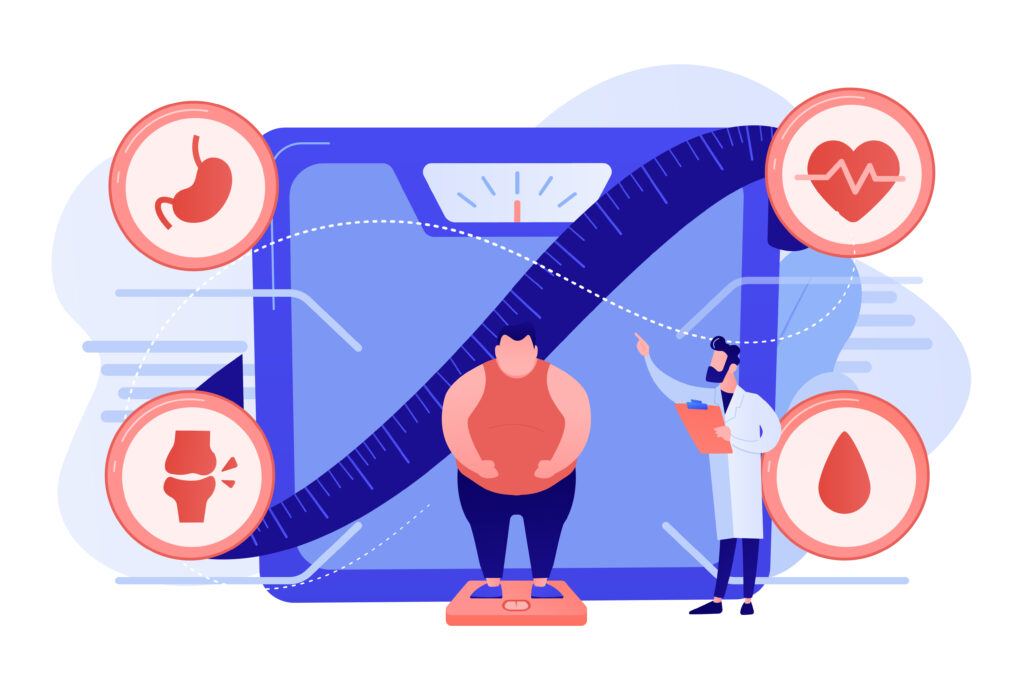Obesity and heart disease are closely linked, with excess weight being a significant risk factor for developing cardiovascular problems. As obesity rates rise globally, so do the instances of heart-related conditions, such as high blood pressure, heart attacks, and strokes.
Carrying excess body fat, particularly around the abdomen, puts added strain on the heart, leading to increased cholesterol levels, elevated blood pressure, and inflammation. The good news is that weight loss, even in modest amounts, can dramatically lower the risk of heart disease by improving cardiovascular health, regulating blood pressure, and reducing cholesterol levels. In this article, we’ll explore the strong connection between obesity and heart disease and how weight loss can be a powerful tool in lowering cardiovascular risk.
Understanding Obesity

Obesity is a complex health condition characterized by excessive body fat that can negatively impact an individual’s overall health. It is typically assessed using the Body Mass Index (BMI), a calculation based on height and weight. A BMI of 30 or higher is classified as obese. Obesity is not merely a cosmetic concern; it is a significant public health issue linked to numerous chronic diseases, including heart disease, diabetes, and certain types of cancer.
Several factors contribute to the development of obesity, including genetic, behavioral, environmental, and metabolic influences. Lifestyle choices, such as poor dietary habits and physical inactivity, play a crucial role in weight gain. The modern environment often promotes sedentary behaviors and easy access to high-calorie, low-nutrient foods, making it increasingly challenging for individuals to maintain a healthy weight.
Understanding obesity also involves recognizing the psychological aspects that may accompany the condition. Emotional factors, such as stress, depression, and anxiety, can lead to unhealthy eating patterns and physical inactivity, creating a cycle that perpetuates weight gain. Additionally, societal stigma surrounding obesity can affect mental health and self-esteem, making it essential to address these issues holistically.
In summary, obesity is a multifaceted condition influenced by various factors, including genetics, lifestyle, and emotional health. Recognizing the complexities of obesity is vital for developing effective prevention and treatment strategies to combat this growing health crisis and promote overall well-being.
The Connection Between Obesity and Heart Disease

The link between obesity and heart disease is well-established, with numerous studies showing that excess body weight significantly increases the risk of developing cardiovascular conditions. Obesity can lead to a range of physiological changes that negatively affect heart health, making it crucial to understand this connection.
One of the primary ways obesity impacts heart health is through the development of atherosclerosis, a condition characterized by the buildup of fatty deposits (plaque) in the arteries. As body fat increases, it can lead to elevated levels of cholesterol and triglycerides in the bloodstream, contributing to plaque formation. This narrowing of the arteries can restrict blood flow, raising the risk of heart attacks and strokes.
Moreover, obesity is associated with increased inflammation in the body, which is a key factor in the development of heart disease. Adipose tissue, or body fat, releases inflammatory substances known as cytokines. These inflammatory markers can cause damage to blood vessels and promote the progression of atherosclerosis. Additionally, obesity often leads to other conditions, such as high blood pressure and insulin resistance, which further increase cardiovascular risk.
Another significant aspect of the obesity-heart disease connection is the impact on heart function. Excess weight forces the heart to work harder to pump blood throughout the body, leading to an enlarged heart and increased risk of heart failure. The strain on the heart can result in various complications, including arrhythmias and decreased overall heart efficiency.
In summary, the connection between obesity and heart disease is multifaceted, involving biochemical, physiological, and structural changes in the body. Addressing obesity through lifestyle changes, including improved diet and increased physical activity, is essential for reducing cardiovascular risk and promoting overall heart health.
The Impact of Weight Loss on Cardiovascular Health

Weight loss has a profound positive impact on cardiovascular health, offering significant benefits for individuals struggling with obesity or overweight. Even modest weight reduction—typically defined as losing 5-10% of body weight—can lead to substantial improvements in heart health markers and overall well-being.
One of the most immediate effects of weight loss is the reduction in blood pressure. As excess weight is lost, the strain on the heart and blood vessels diminishes, often resulting in lower blood pressure readings. This reduction helps decrease the risk of heart disease, stroke, and other cardiovascular complications. Studies have shown that individuals with hypertension can experience significant improvements in blood pressure control with even small amounts of weight loss.
Additionally, weight loss positively influences cholesterol levels. Excess body fat is linked to elevated levels of LDL (low-density lipoprotein) cholesterol, often referred to as “bad” cholesterol, and triglycerides. As individuals lose weight, they often see an increase in HDL (high-density lipoprotein) cholesterol, known as “good” cholesterol. This favorable shift in cholesterol levels reduces the risk of atherosclerosis and heart disease.
Weight loss also improves insulin sensitivity and reduces the risk of developing type 2 diabetes, a significant risk factor for cardiovascular disease. By shedding excess pounds, the body becomes more efficient at utilizing insulin, leading to better blood sugar control. This improvement not only helps prevent diabetes but also reduces the likelihood of related cardiovascular complications.
Moreover, weight loss can enhance overall heart function. As individuals lose weight, the heart becomes less burdened, improving its efficiency and reducing the risk of heart failure. Regular physical activity, often part of a weight loss journey, further strengthens the heart muscle and promotes better cardiovascular health.
Weight Loss Strategies for Reducing Cardiovascular Risk
Reducing cardiovascular risk through weight loss involves a combination of dietary modifications, physical activity, and behavioral changes. Implementing effective strategies can lead to significant health improvements and promote long-term heart health. Here are some key weight loss strategies to consider:
1. Adopt a Heart-Healthy Diet
A well-balanced diet is fundamental for weight loss and cardiovascular health. Focus on incorporating the following elements:
- Fruits and Vegetables: Aim for a variety of colorful fruits and vegetables rich in vitamins, minerals, and antioxidants that support heart health.
- Whole Grains: Choose whole grains like brown rice, quinoa, and whole wheat bread over refined grains to help stabilize blood sugar levels and promote satiety.
- Healthy Fats: Include sources of healthy fats such as avocados, nuts, seeds, and olive oil, while limiting saturated and trans fats found in processed foods.
- Lean Proteins: Opt for lean protein sources such as fish, poultry, legumes, and low-fat dairy to support muscle maintenance and overall health.
2. Incorporate Regular Physical Activity

Physical activity plays a crucial role in weight loss and cardiovascular health. Aim for a combination of aerobic exercises, strength training, and flexibility workouts:
- Aerobic Exercises: Engage in at least 150 minutes of moderate-intensity aerobic activity each week, such as brisk walking, swimming, or cycling. This helps burn calories and improve heart function.
- Strength Training: Incorporate strength training exercises at least two days a week. Building muscle can boost metabolism and improve body composition.
- Stay Active: Look for opportunities to increase daily physical activity, such as taking the stairs, walking during breaks, or gardening.
3. Monitor Portion Sizes and Mindful Eating
Being aware of portion sizes and practicing mindful eating can help prevent overeating and promote healthier choices:
- Portion Control: Use smaller plates and bowls to help manage portion sizes. Pay attention to serving sizes on nutrition labels and try to avoid eating straight from packages.
- Mindful Eating: Practice mindfulness by savoring each bite and minimizing distractions during meals. This can help increase satisfaction and reduce the urge to eat more than necessary.
4. Establish a Consistent Routine
Creating a structured eating and exercise routine can enhance weight loss efforts:
- Meal Planning: Plan meals and snacks in advance to make healthier choices and avoid impulsive eating. Include a variety of foods to ensure nutritional balance.
- Regular Exercise Schedule: Set a consistent workout schedule that fits your lifestyle, making it easier to stick to your physical activity goals.
5. Seek Support and Accountability
Having a support system can make a significant difference in your weight loss journey:
- Join Support Groups: Consider joining a weight loss or health support group, whether in-person or online. Sharing experiences and challenges can provide motivation and accountability.
- Work with Professionals: Consult a registered dietitian or a certified personal trainer for personalized guidance and support tailored to your needs and goals.
6. Manage Stress and Prioritize Sleep
Chronic stress and inadequate sleep can hinder weight loss and contribute to cardiovascular risk:
- Stress Management: Incorporate stress-reducing activities into your routine, such as yoga, meditation, or deep-breathing exercises.
- Sleep Hygiene: Aim for 7-9 hours of quality sleep each night. Poor sleep can disrupt hormonal balance and increase cravings for unhealthy foods.
The Role of Medical Intervention in Weight Loss
Medical intervention can play a crucial role in the weight loss journey for individuals struggling with obesity or overweight, especially when lifestyle changes alone have proven insufficient. Depending on the individual’s health status and weight loss goals, several medical options are available to support weight loss efforts. These interventions can range from prescription medications to surgical procedures, each with unique benefits and considerations.
1. Prescription Medications
For individuals who find it challenging to lose weight through diet and exercise alone, prescription medications may offer additional support. These medications are typically prescribed for those with a BMI of 30 or higher or a BMI of 27 with related health conditions, such as hypertension or diabetes. Some common weight loss medications include:
- Appetite Suppressants: Medications like phentermine and liraglutide help reduce hunger and promote feelings of fullness, making it easier to adhere to a reduced-calorie diet.
- Fat Absorption Inhibitors: Orlistat is a medication that works by blocking the absorption of dietary fat in the intestines, leading to lower calorie intake.
- Combination Medications: Some newer medications combine multiple mechanisms to support weight loss, addressing both appetite control and metabolism.
While these medications can be effective, they are most beneficial when used in conjunction with lifestyle changes, such as a balanced diet and regular physical activity. It’s important to discuss potential side effects and long-term safety with a healthcare provider.
2. Bariatric Surgery
For individuals with severe obesity, bariatric surgery may be a recommended option. This surgical intervention is typically considered for those with a BMI of 40 or higher or a BMI of 35 with obesity-related health conditions. Common types of bariatric surgery include:
- Gastric Bypass: This procedure involves creating a small pouch from the stomach and connecting it directly to the small intestine, reducing the amount of food that can be consumed and absorbed.
- Gastric Sleeve: This surgery removes a portion of the stomach, resulting in a smaller stomach size that limits food intake and reduces hunger hormone production.
- Adjustable Gastric Banding: This involves placing an inflatable band around the upper part of the stomach to create a small pouch, limiting food intake and inducing feelings of fullness.
Bariatric surgery can lead to significant and sustained weight loss, as well as improvements in obesity-related conditions such as diabetes, hypertension, and sleep apnea. However, it requires a commitment to lifestyle changes and follow-up care to ensure long-term success.
3. Medical Supervision and Support
Medical intervention also encompasses comprehensive weight management programs that provide ongoing support, education, and accountability. These programs may include:
- Regular Health Assessments: Monitoring progress through regular check-ups can help individuals stay on track with their weight loss goals and adjust strategies as needed.
- Nutritional Counseling: Working with a registered dietitian can provide personalized meal plans and nutrition education to promote healthy eating habits.
- Behavioral Therapy: Psychological support, including cognitive-behavioral therapy (CBT), can help address emotional eating, motivation, and other behavioral aspects of weight management.
Monitoring Heart Health During Weight Loss
Embarking on a weight loss journey can have profound effects on overall health, particularly cardiovascular health. As individuals shed pounds, it’s essential to monitor heart health to ensure that weight loss efforts are beneficial and do not inadvertently lead to complications. Here are key strategies for effectively monitoring heart health during weight loss.
1. Regular Health Check-Ups
Frequent check-ups with a healthcare provider are crucial for assessing heart health during weight loss. These visits can help track vital signs and overall progress:
- Blood Pressure Monitoring: High blood pressure is a significant risk factor for heart disease. Regular monitoring can help identify any fluctuations that may occur as weight is lost.
- Cholesterol Levels: A lipid panel can assess cholesterol levels, including LDL (bad cholesterol), HDL (good cholesterol), and triglycerides. Weight loss often leads to improvements in these markers, but it’s important to track them over time.
- Blood Sugar Levels: Monitoring blood sugar is vital, especially for individuals with diabetes or prediabetes. Weight loss can enhance insulin sensitivity, so regular testing can guide dietary and lifestyle adjustments.
2. Heart Rate Monitoring
Tracking heart rate can provide insights into cardiovascular fitness and overall heart health. Several methods can be utilized:
- Resting Heart Rate: Measuring resting heart rate first thing in the morning can indicate cardiovascular fitness. A lower resting heart rate typically signifies improved heart health.
- Exercise Heart Rate: Monitoring heart rate during exercise can help ensure that workouts are effective without overexerting the heart. Aim to stay within the target heart rate zone to maximize fat burning and cardiovascular benefits.
- Wearable Devices: Many fitness trackers and smartwatches offer heart rate monitoring features, providing real-time feedback and long-term trends.
3. Symptoms Awareness
Being vigilant about any symptoms that may arise during weight loss is essential for maintaining heart health. Pay attention to:
- Shortness of Breath: Increased breathlessness during physical activity can indicate cardiovascular strain. Consult a healthcare professional if this symptom arises unexpectedly.
- Chest Pain or Discomfort: Any new or worsening chest pain should be addressed immediately, as it could signify a heart issue.
- Fatigue and Dizziness: Unusual fatigue or dizziness during daily activities may suggest underlying heart problems and should not be ignored.
4. Nutritional Considerations
Diet plays a crucial role in both weight loss and heart health. Monitoring nutritional intake can help optimize both:
- Balanced Diet: Focus on a heart-healthy diet rich in fruits, vegetables, whole grains, lean proteins, and healthy fats. This approach supports weight loss while benefiting cardiovascular health.
- Sodium and Sugar Intake: Reducing sodium and added sugars can help manage blood pressure and weight. Keep track of labels and portion sizes to maintain a healthy balance.
- Hydration: Staying well-hydrated is vital for heart function. Monitoring fluid intake, especially during weight loss, can support overall health.
5. Physical Activity Tracking
Regular physical activity is key to both weight loss and heart health. Monitoring exercise routines can enhance their effectiveness:
- Cardiovascular Exercise: Engage in at least 150 minutes of moderate-intensity aerobic activity each week. Tracking workouts can help ensure consistency and progress.
- Strength Training: Include strength training exercises at least two days a week. This can help build muscle mass and boost metabolism, supporting weight loss.
- Flexibility and Balance: Incorporating activities like yoga or stretching can improve overall fitness and reduce the risk of injury during workouts.
Long-Term Lifestyle Changes for Sustainable Weight Loss

Achieving sustainable weight loss is not just about shedding pounds; it’s about adopting long-term lifestyle changes that promote health and well-being. Quick fixes and fad diets often lead to temporary results, but to maintain a healthy weight and improve overall health, it’s essential to focus on lasting changes. Here are key strategies to consider for long-term success in weight management.
1. Adopt a Balanced Diet
A balanced diet is foundational for sustainable weight loss. Instead of resorting to restrictive diets, aim for a well-rounded approach that includes:
- Whole Foods: Prioritize fruits, vegetables, whole grains, lean proteins, and healthy fats. These foods are nutrient-dense and can help control hunger while providing essential vitamins and minerals.
- Portion Control: Learn to recognize appropriate portion sizes to prevent overeating. Using smaller plates and being mindful of serving sizes can help manage calorie intake.
- Meal Planning: Plan meals and snacks in advance to avoid impulsive eating. This strategy can help ensure you have healthy options readily available, reducing the temptation to choose convenience foods that may be less nutritious.
2. Increase Physical Activity
Regular physical activity is crucial for weight loss and overall health. Incorporating movement into your daily routine can help you burn calories and improve your cardiovascular fitness:
- Find Enjoyable Activities: Choose exercises that you enjoy, whether it’s dancing, swimming, cycling, or hiking. When you enjoy what you do, you’re more likely to stick with it.
- Set Realistic Goals: Aim for at least 150 minutes of moderate-intensity aerobic exercise each week, along with strength training at least twice a week. Setting achievable goals can help you stay motivated and track progress.
- Incorporate Movement into Daily Life: Look for opportunities to be active throughout the day, such as taking the stairs instead of the elevator, walking or biking instead of driving short distances, and engaging in active hobbies.
3. Practice Mindful Eating
Mindful eating involves paying attention to your hunger cues and being present during meals. This practice can help prevent overeating and improve your relationship with food:
- Listen to Your Body: Learn to differentiate between physical hunger and emotional cravings. Eat when you’re hungry and stop when you’re satisfied, rather than eating out of boredom or stress.
- Slow Down: Take your time while eating. Chewing thoroughly and savoring each bite can enhance enjoyment and help you recognize when you’re full.
- Limit Distractions: Avoid eating in front of screens or while multitasking. Focusing on your meal can help you become more attuned to your body’s signals.
4. Manage Stress and Emotions
Stress and emotional well-being play a significant role in weight management. Learning to cope with stress in healthy ways can prevent emotional eating:
- Identify Triggers: Recognize the situations or emotions that lead to overeating. Keeping a food diary can help you identify patterns and develop strategies to address them.
- Develop Healthy Coping Mechanisms: Instead of turning to food for comfort, find alternative activities that promote relaxation and joy, such as exercise, meditation, or spending time with loved ones.
- Seek Support: Consider talking to a therapist or joining a support group if you struggle with emotional eating or stress management. Professional guidance can provide valuable tools for coping and accountability.
5. Get Enough Sleep
Quality sleep is essential for maintaining a healthy weight. Poor sleep can disrupt hormones related to hunger and appetite, making it harder to lose weight:
- Aim for 7-9 Hours: Strive for adequate sleep each night to support overall health and weight management.
- Establish a Routine: Create a consistent sleep schedule by going to bed and waking up at the same time each day. This can improve sleep quality and help regulate appetite hormones.
- Limit Screen Time Before Bed: Reducing exposure to screens in the hour leading up to bedtime can promote better sleep quality.
6. Stay Hydrated
Staying well-hydrated is often overlooked but is crucial for weight loss and overall health:
- Drink Water: Aim to drink plenty of water throughout the day. Sometimes, thirst can be mistaken for hunger, leading to unnecessary snacking.
- Limit Sugary Beverages: Reduce or eliminate sugary drinks and high-calorie beverages. Opt for water, herbal teas, or other low-calorie options.
7. Set Realistic Goals and Track Progress
Setting achievable goals can help maintain motivation and provide a sense of accomplishment:
- SMART Goals: Set Specific, Measurable, Achievable, Relevant, and Time-bound goals for your weight loss journey. This structure can enhance clarity and focus.
- Track Progress: Keep a journal or use apps to track food intake, exercise, and weight changes. Monitoring your progress can provide insights and help you make necessary adjustments.
When to Seek Professional Help
Embarking on a weight loss journey can be challenging, and while many individuals can achieve their goals through self-guided efforts, there are times when seeking professional help is crucial. Understanding when to reach out for support can make a significant difference in your weight loss success and overall health. Here are some key indicators that it may be time to consult with a healthcare professional or a registered dietitian:
1. Struggling with Emotional Eating or Binge Eating
If you find that emotional eating or binge eating is significantly impacting your ability to lose weight or maintain a healthy lifestyle, it may be beneficial to seek professional help. A therapist or counselor specializing in eating disorders can help you understand the underlying emotional triggers and develop healthier coping strategies.
2. Unexplained Weight Gain or Loss
If you experience sudden or unexplained weight gain or loss, it’s essential to consult with a healthcare provider. Unintentional weight changes can be indicative of underlying health issues, such as hormonal imbalances, thyroid disorders, or other medical conditions that require evaluation and intervention.
3. Persistent Health Issues
If you have existing health conditions (such as diabetes, heart disease, or hypertension) and are struggling to manage your weight, consulting a healthcare professional is advisable. They can provide tailored guidance and support that aligns with your health needs and goals, ensuring a safe and effective weight loss plan.
4. Plateauing or Stalling in Weight Loss
If you’ve hit a plateau and find it increasingly difficult to lose weight despite consistent efforts with diet and exercise, it may be time to seek professional advice. A registered dietitian can help assess your current eating patterns, exercise regimen, and metabolic health, providing personalized recommendations to break through the plateau.
5. Confusion About Nutrition and Dieting
With the abundance of information available about diets and nutrition, it’s easy to feel overwhelmed or confused. If you’re unsure which dietary approaches are best for you or how to create a balanced meal plan, consulting a registered dietitian can offer clarity and evidence-based guidance tailored to your specific needs.
6. Lack of Progress or Motivation
If you’re struggling to stay motivated or find that your weight loss efforts are not yielding the desired results, a professional can provide accountability and support. Whether through regular check-ins or personalized coaching, working with a professional can help reignite your motivation and keep you focused on your goals.
7. Considering Medical Weight Loss Interventions
If you’ve tried multiple weight loss strategies without success and are considering medical interventions (such as prescription medications or weight loss surgery), it’s essential to consult with a healthcare provider who specializes in weight management. They can evaluate your medical history, provide information on available options, and determine the best course of action for your situation.
8. Experiencing Symptoms of Nutritional Deficiencies
If you notice symptoms such as fatigue, weakness, hair loss, or changes in skin health, it may indicate nutritional deficiencies resulting from restrictive dieting or inadequate nutrient intake. Consulting a healthcare professional can help identify and address these issues, ensuring you receive proper nutrition while pursuing weight loss.
9. Desiring a Structured Program
If you prefer a structured approach to weight loss, consider seeking out weight loss programs or clinics that offer professional guidance. These programs often provide a comprehensive plan that includes nutrition counseling, exercise programs, and behavioral therapy, making it easier to achieve and maintain your weight loss goals.
Conclusion
The connection between obesity and heart disease is a critical public health concern that cannot be overlooked. Excess weight places additional strain on the heart, increases blood pressure, and disrupts metabolic processes, all of which significantly elevate the risk of cardiovascular diseases. However, the good news is that weight loss can be a powerful tool in mitigating these risks and improving heart health.
By adopting sustainable lifestyle changes, such as following a balanced diet, engaging in regular physical activity, and managing stress, individuals can effectively reduce their body weight and, in turn, their risk of developing heart disease. Even modest weight loss—typically around 5-10% of body weight—can lead to significant improvements in heart health markers, including lower blood pressure, improved cholesterol levels, and enhanced overall cardiovascular function.
Ultimately, understanding the link between obesity and heart disease highlights the importance of proactive measures in managing weight. It serves as a reminder that prioritizing heart health through weight management is not just about aesthetics, but about enhancing quality of life and longevity. By committing to a healthier lifestyle and seeking support when needed, individuals can take meaningful steps toward reducing their cardiovascular risk and achieving lasting well-being.
FAQs
1. What is the link between obesity and heart disease?
Obesity is a significant risk factor for heart disease. Excess body fat can lead to high blood pressure, high cholesterol levels, and insulin resistance, all of which increase the risk of cardiovascular diseases. Additionally, obesity contributes to inflammation and changes in blood flow, further straining the heart.
2. How does weight loss improve heart health?
Weight loss can improve heart health by reducing the burden on the heart and improving various cardiovascular risk factors. It can lower blood pressure, decrease bad cholesterol (LDL), increase good cholesterol (HDL), and improve blood sugar levels, all of which contribute to a healthier heart.
3. How much weight do I need to lose to reduce my heart disease risk?
Even a modest weight loss of 5-10% of your total body weight can lead to significant improvements in heart health. For example, if you weigh 200 pounds, losing just 10-20 pounds can positively impact your blood pressure, cholesterol levels, and overall cardiovascular risk.
4. What lifestyle changes can help with weight loss and heart health?
Adopting a balanced diet rich in fruits, vegetables, whole grains, lean proteins, and healthy fats is essential. Regular physical activity, stress management, and getting adequate sleep are also crucial for effective weight loss and improving heart health.
5. Are there specific diets recommended for weight loss and heart health?
Several dietary patterns can promote weight loss and heart health, including the Mediterranean diet, DASH (Dietary Approaches to Stop Hypertension), and plant-based diets. These diets emphasize whole, nutrient-dense foods and limit processed foods, sugars, and unhealthy fats.
6. Is exercise important for weight loss and heart health?
Yes, regular physical activity is vital for both weight loss and cardiovascular health. Aim for at least 150 minutes of moderate-intensity aerobic exercise each week, combined with strength training exercises at least twice a week. Exercise helps burn calories, build muscle, and improve overall heart function.
7. How can I monitor my heart health while losing weight?
Regular check-ups with your healthcare provider can help monitor your heart health. They can assess your blood pressure, cholesterol levels, and other relevant markers. Keeping track of your progress and staying informed about your health can help you make necessary adjustments along your weight loss journey.
8. When should I seek medical advice for weight loss and heart health?
If you have underlying health conditions, such as diabetes, hypertension, or a history of heart disease, it’s essential to consult a healthcare professional before starting a weight loss program. Additionally, if you experience significant weight fluctuations or health concerns related to your weight, seeking medical advice is recommended.
9. Can weight loss alone prevent heart disease?
While weight loss can significantly reduce the risk of heart disease, it is not a standalone solution. A comprehensive approach that includes healthy eating, regular exercise, stress management, and medical monitoring is essential for optimal heart health.
10. What support options are available for weight loss and heart health?
Support options include working with a registered dietitian, joining weight loss groups, or participating in heart health programs. Professional guidance can provide accountability, personalized strategies, and encouragement to help you achieve your weight loss and heart health goals.




Pingback: PCOS and Weight Loss: Why It's Harder and How to Succeed -
Pingback: Emotional Eating and Obesity: How to Break Free from Unhealthy Habits -
Pingback: Cancer and Weight Loss: Recognizing Unintentional Weight Loss as a Warning Sign -
Thank you for sharing superb informations. Your web-site is so cool. I am impressed by the details that you’ve on this site. It reveals how nicely you understand this subject. Bookmarked this web page, will come back for more articles. You, my friend, ROCK! I found just the information I already searched all over the place and simply couldn’t come across. What an ideal site.